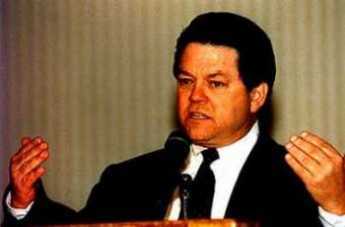Related Topics
Whither, Federal Reserve? (1) Before Our Crash
The Federal Reserve seems to be a big black box, containing magic. In fact, its high-wire acrobatics must not be allowed to fail. Nevertheless, it may be time to consider revising or replacing it.
Making Money (6): The Laffer Curve

|
| Arthur Laffer |
Recall for a moment, the two Republican idols, economists Milton Friedman and Arthur Laffer. Friedman won a Nobel Prize by observing that inflation is "always and everywhere" caused by too much money in circulation. Thus, a potential remedy for inflation was suggested: central banks (i.e. the Federal Reserve) can restrain that by raising short-term interest rates at the first sign of inflation. It certainly seemed to work; by doing so, Federal Reserve Chairman Alan Greenspan was able to avoid inflation for eighteen years.
Arthur Laffer offered a second idea for Presidents to test. Laffer maintained that if taxes were too high, you would paradoxically collect more taxes by lowering tax rates. The younger George Bush took him up on it, reasoning that if tax collections did rise after tax rates were cut, it would be proof that taxes had been too high all along. The appeal to tax technicians in the Treasury Department was that, by observing tax collections, all changes in tax rates up or down might lead to the identification of the most efficient possible tax rates. So, although President Reagan had felt warm about Laffer, while the senior George Bush rudely dismissed such ideas, George W. was eager to test his gut feeling that tax rates were too high. Each year during his presidency, George W cut taxes. Gratifyingly, each year total tax revenue (adjusted for GDP) increased. Eight years are not the same as eighteen, but it certainly looks as though W proved that taxes had indeed been too high. If some future Congress has the courage to raise taxes, and then tax collections go down, the Bush legacy would seem pretty secure. Two iron laws of national economics would be enshrined: The tax rate should be whatever maximizes tax revenue. Interest rates should be whatever restrains inflation. Live with it.
True, none of this insight casts much light on how to cope with wars and depressions. Raising interest rates seemingly defeats inflation, but lowering interest rates has not always cured recessions. Furthermore, the fiscal and monetary direction of the country may have to be altered when we face war, famine, weather disasters, and demographic shifts. But at least we seem to know how to determine the optimum level of (overnight, interbank) interest rates and taxes, so have a compass for return to those levels after detours around uncertain events. Maybe economists, even Voodoo economists, can suggest some other principles which politicians can test in the real economy. And political science can then start to have some true scientific method in it; propose a theory, test it, revise the theory and test it again.
But there's one more thing that Art Laffer didn't understand when he was drawing his famous curve on the back of a paper napkin. One of the main reasons tax collections rose spectacularly when George Bush finally had the nerve to try lowering taxes -- was that the underground, tax-evading, economy was a great deal larger than anyone had suspected. Laffer made crooks into honest people.
Originally published: Thursday, June 22, 2006; most-recently modified: Thursday, May 23, 2019